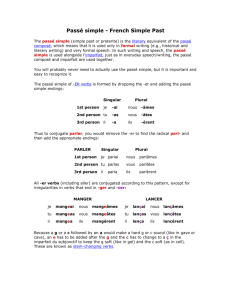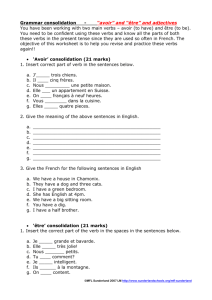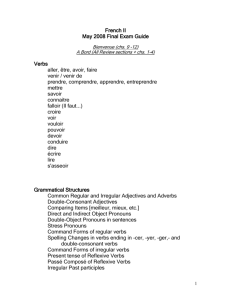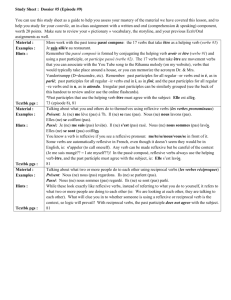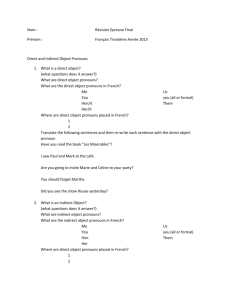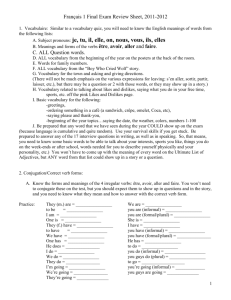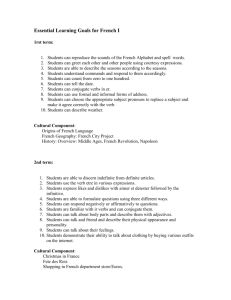sem1review
advertisement
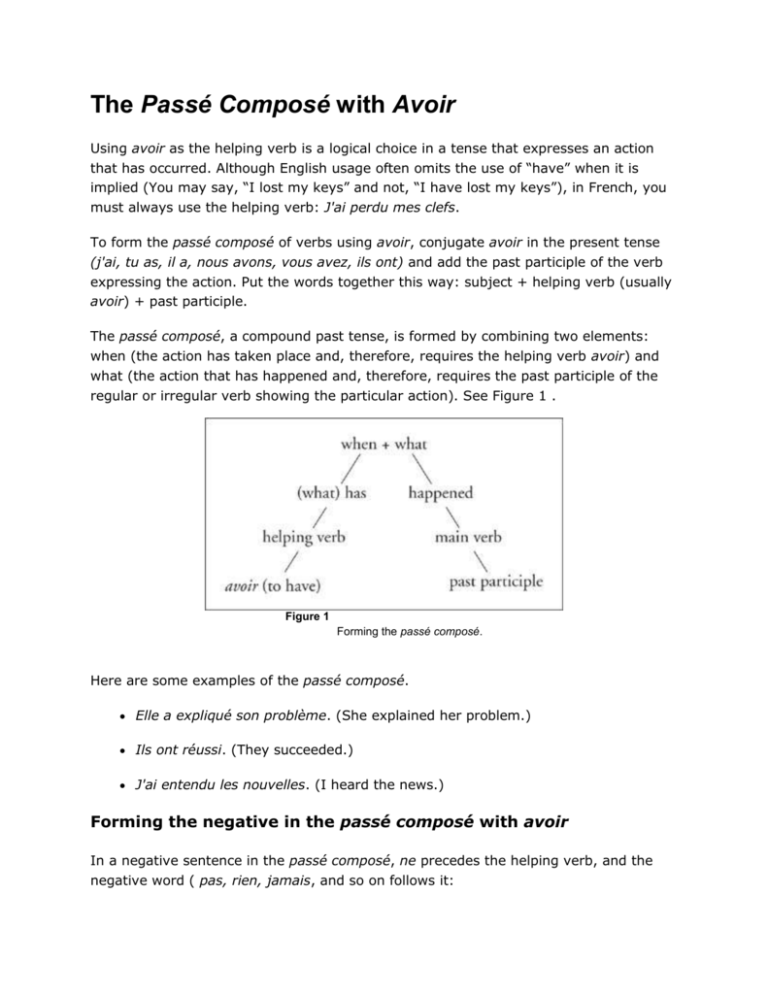
The Passé Composé with Avoir Using avoir as the helping verb is a logical choice in a tense that expresses an action that has occurred. Although English usage often omits the use of “have” when it is implied (You may say, “I lost my keys” and not, “I have lost my keys”), in French, you must always use the helping verb: J'ai perdu mes clefs. To form the passé composé of verbs using avoir, conjugate avoir in the present tense (j'ai, tu as, il a, nous avons, vous avez, ils ont) and add the past participle of the verb expressing the action. Put the words together this way: subject + helping verb (usually avoir) + past participle. The passé composé, a compound past tense, is formed by combining two elements: when (the action has taken place and, therefore, requires the helping verb avoir) and what (the action that has happened and, therefore, requires the past participle of the regular or irregular verb showing the particular action). See Figure 1 . Figure 1 Forming the passé composé. Here are some examples of the passé composé. Elle a expliqué son problème. (She explained her problem.) Ils ont réussi. (They succeeded.) J'ai entendu les nouvelles. (I heard the news.) Forming the negative in the passé composé with avoir In a negative sentence in the passé composé, ne precedes the helping verb, and the negative word ( pas, rien, jamais, and so on follows it: Je n'ai rien préparé. (I didn't prepare anything.) Nous n'avons pas fini le travail. (We didn't finish the work.) Il n'a jamais répondu à la lettre. (He never answered the letter.) Questions in the passé composé with avoir To form a question in the passé composé using inversion, invert the conjugated helping verb with the subject pronoun and add a hyphen. Then place the negative around the hyphenated helping verb and subject pronoun: As-tu mangé? (Did you eat?) N'as-tu rien mangé? (Didn't you eat anything?) A-t-il attendu les autres? (Did he wait for the others?) N'a-t-il pas attendu? (Didn't he wait for the others?) Regular verbs follow a prescribed set of rules for the formation of the past participle, whereas irregular verbs (discussed in the following section) must be memorized. Past participles of verbs conjugated with avoir agree in gender (masculine or feminine — add e) and number (singular or plural — add s) with a preceding direct object noun or pronoun: Le(s) film(s)? (The film[s]?) Je l'(les)ai aimé(s). (I liked it [them].) Quelle(s) robe(s) a-t-elle choisie(s)? (Which dress[es] did she choose?) Il nous a vus. (He saw us.) The Passé Composé with Être The passé composé of 17 verbs is formed by combining the present tense of être (je suis, tu es, il est, nous sommes, vous êtes, ils sont) and then adding the past participle of the verb showing the action. Most of these verbs express motion or a change of place, state, or condition (that is, going up, going down, going in, going out, or remaining). Dr. and Mrs. Vandertrampp live in the house in Figure 1 , as illustrated in Table 1 . Their name may help you memorize the 17 verbs using être. An asterisk (*) in Table 6 denotes an irregular past participle. Figure 1 Verbs using être in the passé composé. TABLE 1 Verbs Using Être Verb Past Participle D devenir (to become) devenu* R revenir (to come back) revenu* M mourir (to die) mort* R retourner (to return) retourné S sortir (to go out) sorti V venir (to come) venu* A arriver (to arrive) arrivé N naître (to be born) né* D descendre (to descend) descendu E entrer (to enter) entré R rentrer (to return) rentré tomber (to fall) tombé R rester (to remain) resté A aller (to go) allé M monter (to go up) monté P partir (to leave) parti P passer (to pass by) passé T Verbs whose helping verb is être must show agreement of their past participles in gender (masculine or feminine — add e) and number (singular or plural — add s) with the subject noun or pronoun, as shown in Table 2 : TABLE 2 Agreement with Être Masculine Subjects Feminine Subjects je suis allé je suis allée tu es parti tu es partie il est venu elle est venue nous sommes arrivés nous sommes arrivées vous êtes sorti(s) vous êtes sortie(s) ils sont morts elles sont mortes Remember the following rules when using être as a helping verb in the passé composé: Vous can be a singular or plural subject for both masculine and feminine subjects . Singular Plural Vous êtes entré. (You entered.) Vous êtes entrés. (You entered.) Vous êtes entrée. (You entered.) Vous êtes entrées. (You entered.) For a mixed group, always use the masculine form. Roger et Bernard sont revenus. (Roger and Bernard came back.) Louise et Mireille sont revenues. (Louise and Mireille came back.) Roger et Louise sont revenus. (Roger and Louise came back.) If the masculine past participle ends in an unpronounced consonant, pronounce the consonant for the feminine singular and plural forms: Il est mort. (He died.) Ils sont morts. (They died.) Elle est morte. (She died.) Elles sont mortes. (They died.) Forming the negative in the passé composé with être In the negative, put ne before the conjugated form of être and the negative word after it: Il n'est pas sorti. (He didn't go out.) Elles ne sont pas encore arrivées. (They didn't arrive yet.) Questions in the passé composé with être To form a question using inversion, invert the conjugated form of être with the subject pronoun and add a hyphen. The negatives surround the hyphenated verb and pronoun: Sont-ils partis? (Did they leave?) Ne sont-ils pas partis? (Didn't they leave?) The Imparfait The imperfect ( l'imparfait) expresses or describes continued, repeated, habitual actions or incomplete actions, situations, or events in the past. The imperfect describes what was going on at an indefinite time in the past or what used to happen. The imperfect can be translated by “would” when it implies “used to.” The imperfect is a simple tense that does not require a helping verb. The imperfect is formed by dropping the -ons ending from the present tense nous form of the verb and adding the following endings: je: -ais nous: -ions tu: -ais vous: -iez il: -ait ils: -aient The imparfait of regular verbs Table 1 shows how the imparfait is formed with regular verbs. TABLE 1 Forming the Imparfait Jouer Finir Vendre nous jou ons nous finiss ons nous vend ons je jouais je finissais je vendais tu jouais tu finissais tu vendais il jouait il finissait il vendait nous jouions nous finissions nous vendions vous jouiez vous finissiez vous vendiez ils jouaient ils finissaient ils vendaient Here are two examples: Pendant mon enfance, je lisais beaucoup. (During my childhood I read [used to read, would read] a lot.) Je regardais la télé quand le téléphone a sonné. (I was watching TV when the phone rang.) Verbs such as étudier (to study), rire (to laugh), sourire (to smile), and vérifier (to check) already end in -ions in the present. In the imperfect, an extra i is necessary in the nous and vous forms: Nous étudiions pendant des heures. (We were studying for hours.) Vous riiez trop. (You were laughing too much.) The following verbs have spelling changes in the imperfect: Verbs ending in -cer change -c to -ç before -a to maintain the soft c sound in the je, tu, il, and ils forms: La voiture avançait lentement. (The car was advancing slowly.) Commenciez-vous à vous inquiéter? (Were you beginning to get worried?) Verbs ending in -ger insert a silent -e between -g and -a to maintain the soft g sound in the je, tu, il, and ils forms: Il mangeait si vite. (He was eating so quickly.) Nous mangions toujours dans ce restaurant. (We always ate at that restaurant.) The imparfait of irregular verbs Irregular verbs follow the same rules for the formation of the imperfect as do regular verbs. The following is a list of the nous form of the most common irregular verbs. To form the imperfect, simply drop the -ons and add the imperfect endings given earlier: aller (to go): nous allons avoir (to have): nous avons boire (to drink): nous buvons conduire (to drive): nous conduisons connaître (to know): nous connaissons courir (to run): nous courons craindre (to fear): nous craignons croire (to believe): nous croyons devoir (to have to): nous devons dire (to say, to tell): nous disons dormir (to sleep): nous dormons écrire (to write): nous écrivons faire (to make, to do): nous faisons lire (to read): nous lisons mettre (to put): nous mettons offrir (to offer): nous offrons ouvrir (to open): nous ouvrons plaire (to please): nous plaisons pouvoir (to be able to): nous pouvons prendre (to take): nous prenons recevoir (to receive): nous recevons savoir (to know): nous savons suivre (to follow): nous suivons tenir (to hold): nous tenons valoir (to be worth): nous valons venir (to come): nous venons vivre (to live): nous vivons voir (to see): nous voyons vouloir (to wish, to want): nous voulons Note: Falloir (to be necessary) and pleuvoir (to rain) are used only in the il form: il fallait (it was necessary) and il pleuvait (it was raining). Note: The only verb that does not follow the rule for the formation of the imperfect is être (to be), whose imperfect stem is ét-: j'étais, tu étais, il était, nous étions, vous étiez, ils étaient. Passé Composé vs. Imparfait In French, it can be very difficult determining between Passé Composé and the imparfait. There is a simple trick to figure out the difference. When you read a sentence, RELATE IT TO YOUR LIFE!!!! If a sentence were to say, “we liked the same girl…” you didn’t look at her and say WOW then forget about her, you liked her over a duration, so when you use the verb –to like (aimer) you would put it in the imparfait. Now lets look at the Passé! If you were -to eat (manger) you would have ate, and be done with it. It is a completed action. If you were to use the imparfait, you would be portrayed as an obese person talking about your constant meal consumption. To get not only the hang of the usage, look at the chart of formation provided below; also try some of the example sentences. Good luck in finding the differnences in the Passé Composé and the imparfait. REMEMBER: · Passé = you already did it, COMPLETED · Imparfait = DURATION….. still…. going….on. Conjugating Reflexive Verbs A reflexive verb infinitive is identified by its reflexive pronoun se, which is placed before the infinitive and that serves as a direct or indirect object pronoun. A reflexive verb shows that the subject is performing the action upon itself and, therefore, the subject and the reflexive pronoun refer to the same person or thing, as in je m' appelle (I call myself), which is translated to “My name is.” Some verbs must always be reflexive, whereas other verbs may be made reflexive by adding the correct object pronoun. The meaning of some verbs varies depending upon whether or not the verb is used reflexively. Reflexive verbs are always conjugated with the reflexive pronoun that agrees with the subject: me (myself), te (yourself), se (himself, herself, itself, themselves), nous (ourselves), and vous (yourself, yourselves). These pronouns generally precede the verb. Follow the rules for conjugating regular verbs, verbs with spelling changes, and irregular verbs, depending on of the tense, as shown in Table 1 : TABLE 1 Reflexive Verb Conjugation — Present Tense Subject Pronoun Verb je me (m') lève tu te (t') rases il/elle/on se (s') lave nous nous dépêchons vous vous réveillez ils/elles se (s') couchent Reflexive constructions have the following translations: Present tense: Je me lave. (I wash myself.) Imperfect tense:: Je me lavais. (I was washing [used to] myself.) Future tense: Je me laverai. (I will wash myself.) Conditional: Je me laverais. (I would wash myself.) Consider the following most commonly used reflexive verbs. Those marked with asterisks have shoe verb spelling change within the infinitive. s'approcher de (approach) s'arrêter de (stop) se baigner (bathe, swim) se blesser (hurt oneself) se bronzer (tan) se brosser (brush) se brûler (burn oneself) se casser (break) se coiffer (do one's hair) se coucher (go to bed) se couper (cut oneself) se demander (wonder) se dépêcher (hurry) se déshabiller (undress) se détendre (relax) s'endormir (go to sleep) se fâcher (get angry) s'habiller (dress) s'impatienter (become impatient) s'inquiéter de* (worry about) se laver (wash) se lever* (get up) se maquiller (apply make-up) se mettre à (begin) s'occuper de (take care of) se peigner (comb) se présenter (introduce oneself) se promener* (take a walk) se rappeler* (recall) se raser (shave) se reposer (rest) se réunir (meet) se réveiller (wake up) se servir de (use) se tromper (make a mistake) In addition, some French verbs are always reflexive despite the fact that in English they are not: s'écrier (exclaim, cry out) s'en aller (leave, go away) se fier à (trust) se méfier de (distrust) se moquer de (make fun of) se soucier de (care about) se souvenir de (remember) When a subject is followed by two verbs (and keep in mind that when the first one is conjugated, the second must be in the infinitive, the reflexive pronoun precedes the infinitive, because its meaning is tied to that verb: Je vais me dépêcher. (I'm going to hurry.) Il ne va pas se raser. (He's not going to shave.)
